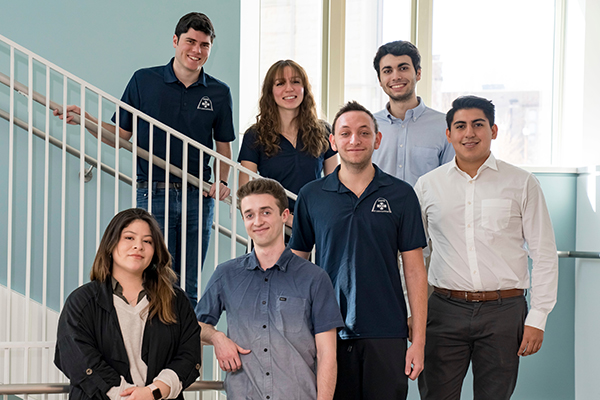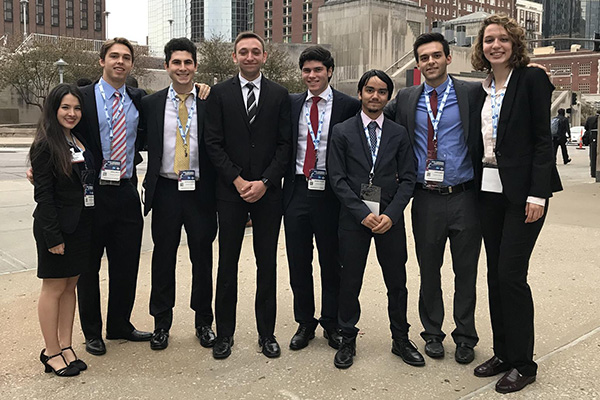Understanding Latinx diversity and building a community
With more than 80,000 Latinx undergraduate students studying engineering in the United States, McKelvey Engineering and SHPE asked: What can we do to recruit more Latinx students to WashU?

For Michael Pichardo and Dylan Zubata, establishing a chapter of the Society of Hispanic Professional Engineers (SHPE) at the McKelvey School of Engineering was more than just forming a new student organization — it was a way to form a community.
Pichardo and Zubata, both earned bachelor's degrees in systems science & engineering in 2020, founded the organization as first-year students at Washington University in St. Louis in 2016.
“When we both got here, the first thing we were looking for was this sense of community similar to that of back home,” Zubata said. “Miami is a melting pot of Hispanics, but WashU and McKelvey Engineering have a small population of Hispanics.”
As high school students from Miami, they toured a few college campuses together before coming to WashU.
With more than 80,000 Latinx undergraduate students studying engineering in the United States, McKelvey Engineering and SHPE asked the question: What can we do to recruit more Latinx students to WashU?
A sense of identity
According to Pichardo, the answer to that question goes back to community. That's why he's excited SHPE and McKelvey Engineering are working together to build that community and to show it to prospective students.
"The school, the university's Office of Undergraduate Admissions and SHPE are engaging more prospective Hispanic engineering students through new communications and new events. We are telling them, 'Look, this is our community. You'll be successful here,'" he said. "I'm happy that this is happening because this is the single most important thing that's going to help students enroll after they're accepted."
Madison Larkin, a senior majoring in mechanical engineering and SHPE's president during the 2019-2020 academic year, cites visiting campus and learning more about organizations like SHPE as one of the reasons she decided to attend WashU.
"I visited WashU during an invitation weekend where I looked at the diversity, and I saw a lot of the Hispanic organizations," Larkin said. "As a Latinx student and as an individual, I want to be involved in my community."
But it is important to understand Latinx diversity when building this community.
Despite being treated as monolithic, Latinx students come together from a wide range of national origins, racial identities and languages. And understanding the multifaceted diversity of Latinx students is key to building an inclusive community.
Identifying potential members can be difficult because it's not always apparent who is or isn't Hispanic.
"A lot of it is self-identification," Larkin said. "Checking that box is the first obstacle in the college experience because some people may not feel like they are Latinx enough or Hispanic enough."
Larkin said much of that comes from people — Hispanic and non-Hispanic alike — with preconceived notions of what it looks like to be Hispanic.
"The non-Latinx community should know that you cannot tell from looking at someone," she added. "Don't question someone's heritage or background, and know that there are struggles — even if they are 'passing' as white or black — that are different from those who are not Latinx."
Building SHPE
Partnering with the school and university to recruit more Latinx students was a big win for SHPE and proof of how much the organization has grown in only a few years.
The group’s hard work has paid off. The number of Hispanic students enrolled in Engineering in the fall of 2020 has doubled compared to fall 2019. Not only are more Hispanic students applying, but, thanks to SHPE’s outreach, more Hispanic students feel welcome on campus.
Attempts to establish SHPE in Engineering had been made previously, but a lack of funds prevented the chapter from taking off. Aware of the challenges, Pichardo and Zubata put together an ambitious fundraising plan. By reaching out to companies, they raised more than $8,000 in their first year.
"I think we've done a great job in such a short time," Pichardo said. "Deans [Chris] Ramsay, [Chris] Kroger] and [Nick] Benassi have said that what we've accomplished has never been done, at least at the rate that we did, and that's something to be proud of."
Benassi, who is the senior associate dean of strategy, communications and external relations and also chief of staff at McKelvey Engineering, has worked to bring more visibility to SHPE and to secure additional funding for both the organization and the recruitment events. "Improving all aspects of diversity, equity and inclusion is a core value at McKelvey," Benassi said. "By helping Latinx student voices be heard and fostering a stronger community at WashU, we hope to create more respect for and a greater understanding of the strength and value of this and other communities that face ongoing inequity and discrimination."
Looking forward
SHPE's leadership hopes to extend its relationships beyond campus by developing ties to the St. Louis community and businesses across the country.
"We want SHPE to be a springboard where students can reach out to top-tier companies at a faster rate," Zubata said. "If we bring Capital One to campus, it's more likely that a member will actually have a one-on-one conversation with a representative, as opposed to just applying online."
During the next academic year, SHPE will bring guest speakers to campus so students can gain first-hand insight from Hispanic and Latinx professionals and will provide professional development workshops for its members.
Their dream, however, is to create a strong alumni network that can serve as a resource for future students and professionals.
"These are the people who are going to go to bat for you for a job early on your career to support you and know where you're coming from," Pichardo said. "If we build our alumni network, it would make the process a lot easier for young Hispanic engineers."

You're invited
Founded in 1974, the national SHPE organization’s mission is to empower Hispanic engineers, and membership is open to everyone.
“Every single time we’ve ever had an event, we emphasize that anyone can come,” Zubata said. “You don’t have to be Hispanic. You don’t have to be an engineer. You could be neither.”
One of the organization’s biggest events of the year, “SHPE Under the SEAS” (playing off of the former School of Engineering & Applied Science name), offers all Engineering students an opportunity to meet with faculty and others in an informal environment.
“We want as many people in McKelvey and across the university to show up,” Zubata said.
To learn more about how to get involved with SHPE, visit shpe.wustl.edu or email shpe@wustl.edu. Alumni, especially those who identify with the organization’s mission, are encouraged to get in touch.
Back to Engineering Momentum